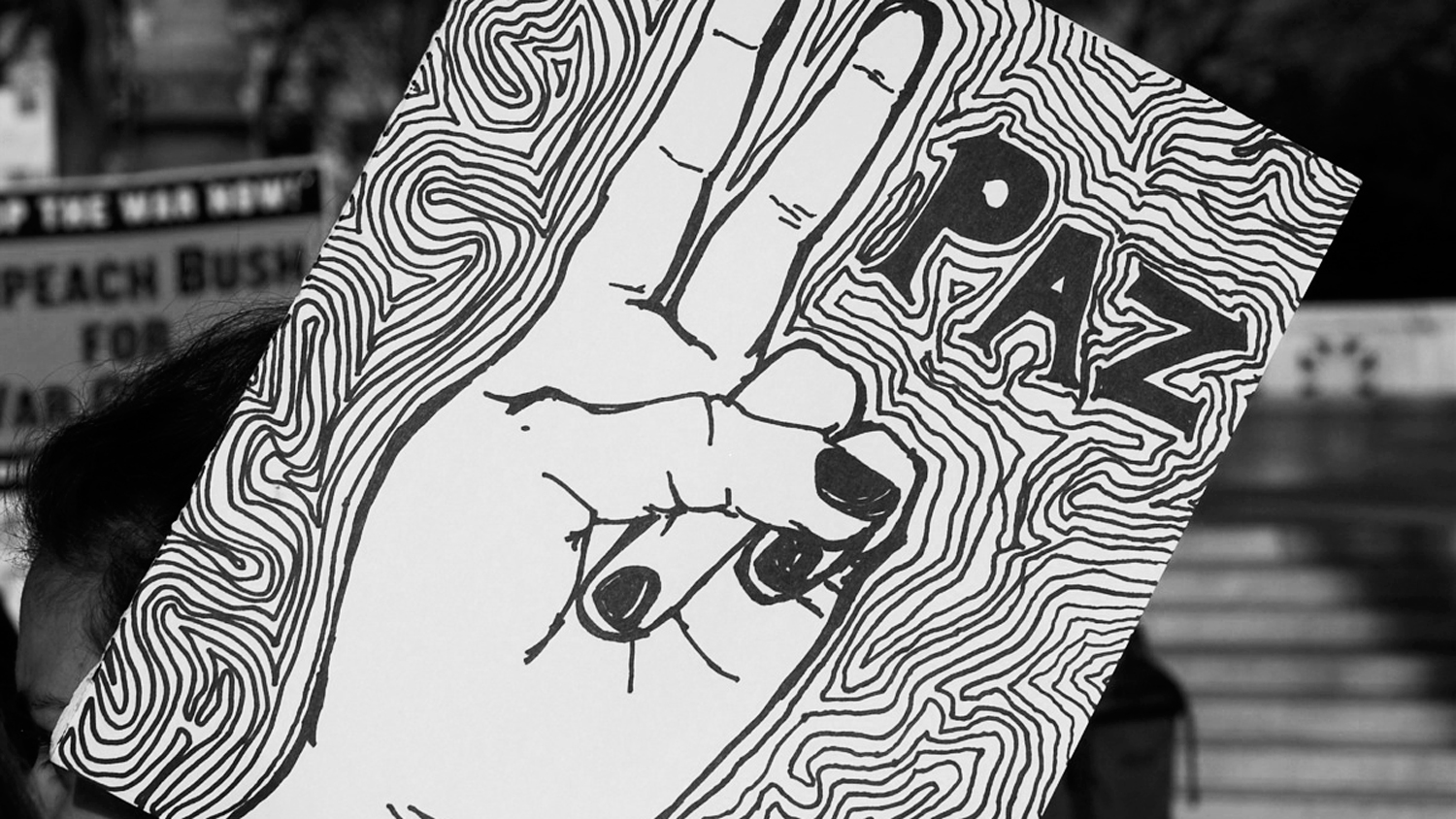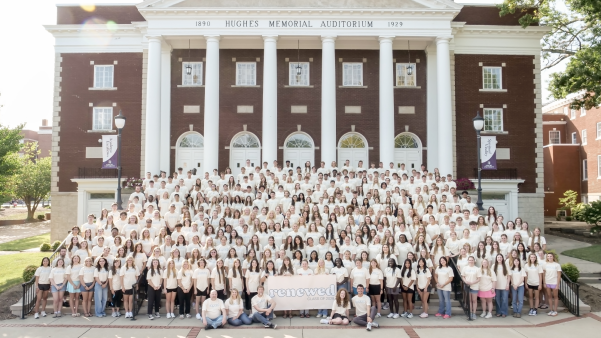As we think about our role as peacemakers in racial reconciliation, Ephesians 2:11-16 details God’s heart for unity within the body of Christ.
Therefore, remember that formerly you who are Gentiles by birth and called “uncircumcised” by those who call themselves “the circumcision” (which is done in the body by human hands) — remember that at that time you were separate from Christ, excluded from citizenship in Israel and foreigners to the covenants of the promise, without hope and without God in the world. But now in Christ Jesus you who once were far away have been brought near by the blood of Christ.
For he himself is our peace, who has made the two groups one and has destroyed the barrier, the dividing wall of hostility, by setting aside in his flesh the law with its commands and regulations. His purpose was to create in himself one new humanity out of the two, thus making peace, and in one body to reconcile both of them to God through the cross, by which he put to death their hostility.
Once we have an understanding of God’s heart, how can we as believers be a part of building racial unity within the body of Christ and in the larger community?
These suggestions are meant to help you think through how you can be a peacemaker in racial reconciliation.
1. Reach out and let your African American friends know you care.
For many in the majority culture, the recent killings of black men seem like an isolated instance, but for African Americans, it’s part of a historical narrative from slavery to “black codes” to Emmett Till that a black life can be taken for the most mundane activities. (See Equal Justice Initiative's from "Slavery to Mass Incarceration.")
Even a message that consists of something as simple as, “I saw what happened, and I just wanted to let you know my heart grieves because your heart grieves,” helps your African American friends know you care.
“Weep with those who weep” (Romans 12:15b).
2. Don’t negate their feelings.
After the shootings in Dallas, Matt Chandler, lead pastor of the Village Church, hosted a discussion with three of the African Americans on his staff ("Justice and Racial Reconciliation"). At the end of the talk, he gave a great analogy about marriage that is applicable in this situation. If your wife is upset, you don’t argue with her about her feelings, you don’t tell her she is wrong to feel that way, you don’t come up with 1,000 reasons she should not be upset with you (at least not in a healthy marriage). If you respond to feelings with facts, it says to the other person that his or her feelings do not matter. In this case, you are dealing with your African American friends’ feelings and rather than trying to argue or negate their feelings, just listen.
Related to this point, do not bring up black-on-black crime or suggest that if the person had just complied they’d be alive.
First, when non-African Americans say these sort of things, the black community just thinks we’re not taking their concerns about racism seriously. In fact, African Americans do care about violence in their communities, and there have been marches and protests in Chicago and other cities for years. There are hundreds of programs dedicated to “keeping young men off the streets” from sports leagues, to afterschool programs, vacation Bible schools, mentoring programs and the list goes on—many of them are based in urban churches. African Americans believe that while whites say they are concerned about black-on-black crime, whites aren’t interested in the specific societal ills of poverty, lack of education, lack of employment, and lack of healthcare and housing.
Because this issue is so prevalent in the African American community, many African American parents give their children a talk around the ages of 12 or 13 about how to survive interactions with the police. This talk consists of advice such as, “Don’t argue. Comply with all requests. Move slowly. Keep your hands visible at all times. Address them as ‘Sir’ or ‘Ma’am.’ Wear your pants on your waist. Explain every movement before you make it.”
3. Understand that to be pro-racial justice does not mean anti-police.
This is not an either/or situation; it is a both/and. Are there some African Americans who are anti-police? Yes, but the vast majority of African Americans recognize the importance of law enforcement officials in our communities. We, too, call the police when we are in accidents, when our homes are broken into or lives are in peril. We recognize their heroic acts of service in situations like Dallas or 9/11 when many rush out, law enforcement and emergency personnel rush in. Most African Americans simply want officers who have broken community trust to be held accountable.
Think about the ways you can help facilitate dialogue between minority and law enforcement communities. At its core, the church is about restoring broken relationships first between humans and God through Jesus Christ, and then in community. As ministers of reconciliation, we can be a part of the efforts to reconcile the broken trust that exists between some communities of color and law enforcement.
4. Understand the heart behind the phrase “black lives matter.”
Some hear “only black lives matter” when in fact it is “black lives matter, too.” If you went to the doctor with a broken arm and the doctor said in response to your specific complaints about your broken arm that “all bones matter,” most people would get up and find another doctor who would address their specific issue. The same is true for the statement of “black lives matter”; those who use the phrase are talking about the specific issue around the unequal treatment of black lives in America. For a better analogy on “black lives matter,” read, “The Importance of ‘Black Lives Matter.’”
While as believers we cannot endorse everything the Black Lives Matter movement stands for, we should be able to affirm their desire to end systemic racism. Systemic racism uses the values, procedures, and policies embedded in an institution to discriminate against people based on race.
As explained by pastor Jemar Tisby, systemic racism is subtler than personal racism because it does not depend on a single actor. Instead, many well-meaning and professedly unbiased people passively cooperate in an invisible complex of principles that work against a certain demographic group.
Black Lives Matter is not a church-based movement the way the civil rights movement of the ’60s was, but the two movements are connected by their desire to see the equal treatment of African Americans in all areas of American life. For more on the connections and differences, read "Is Black Lives Matter the New Civil Rights Movement?"
Black Lives Matter groups have emerged because of a vacuum within our faith community. Rather than criticize, let’s reclaim our critical role at the center of the conversation on racial reconciliation and justice.
5. Build intentional relationships with those who do not look like you.
Many of those who argue that concerns about racism are overblown are without close personal relationships with minorities. If you have not had them in your home and you have not been in theirs you are not friends. You need to move beyond superficial connections. Proximity is important to the ability to feel empathy. You cannot effectively understand or love your African American or Hispanic neighbor if you don’t know them.
6. Read books, watch documentaries, and listen to minority speakers. Sit through things that make you uncomfortable. Wrestle with these difficult questions.
Make sure you understand American history. Do you know about “black codes”? Do you know the stories of Emmett Till and Medgar Evers? Do you know the number of African Americans who were lynched between 1877 and 1950? Do you know what “red-lining” means?
An easy response is to say those things are ancient history, but if history has no importance why do we celebrate the Fourth of July?
Winston Churchill once said, “When the situation was manageable it was neglected, and now that it is thoroughly out of hand we apply too late the remedies which then might have effected a cure. There is nothing new in the story. It is as old as the sibylline books. It falls into that long, dismal catalogue of the fruitlessness of experience and the confirmed unteachability of mankind. Want of foresight, unwillingness to act when action would be simple and effective, lack of clear thinking, confusion of counsel until the emergency comes, until self-preservation strikes its jarring gong–these are the features which constitute the endless repetition of history.”
Or more simply, those who do not know history are doomed to repeat it.
7. Pray.
Prayer is active. Before we begin to do any work, we should discipline ourselves to stop and ask God what his plans are for us. So before you do anything, ask God what role you are to play. Jen Hatmaker has this great analogy about us being a part a great symphony and God has called us to play our one note. Often times we get overwhelmed with the magnitude of the problem, when God has called us each to one specific action.
Racism is at its root a sin problem. It has twisted into many facets of life and created systems of inequity. It won’t be solved overnight. It took African Americans 100 years to get from the Emancipation Proclamation to the Civil Rights Act. So pray and ask God what role you are to play in the pursuit of racial equality and justice in your church, in your neighborhood, in your city, and in this world.
If you are interested in learning more, here are some resources.
Sermons:
Eric Mason: Race, Justice and the Gospel
Matt Chandler: Justice and Racial Reconciliation
Andy Stanley: Skin in the Game
Pastor Joseph Parker: Reflections on Last Week’s Violence
Faith & Race Books:
Divided By Faith by Michael Emerson and Christian Smith
United: Captured by God’s Vision for Diversity by Trillia Newbell
Oneness Embraced by Tony Evans
Many Colors: Cultural Intelligence for Changing Church by Soon Chan Rah
Generous Justice by Tim Keller
Why We Can’t Wait by Martin Luther King Jr.
Disunity in Christ by Christena Cleveland
African American History & Culture Books:
Slavery by Another Name by Douglas Blackmon
Just Mercy by Bryan Stevenson
The New Jim Crow by Michelle Alexander
The Cross and the Lynching Tree by James H. Cone
Between the World and Me by Ta-Nehisi Coates
Parting the Waters by Taylor Branch
The Fire Next Time by James Baldwin
Narrative of the Life of Frederick Douglass by Frederick Douglass
Race Matters by Cornel West
The Souls of Black Folk by W. E. B. DuBois
The Warmth of Other Suns by Isabel Wilkerson
Documentaries:
African Americans: Many Rivers to Cross









